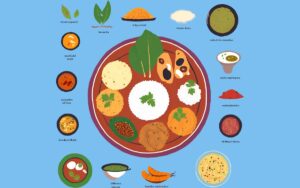
Is South Indian Food India’s Healthiest Cuisine? A Deep Dive: has garnered a reputation as a health food haven. With its emphasis on fermentation, whole grains, and a plethora of plant-based proteins, it’s easy to see why. But does it truly outshine its counterparts in terms of health benefits? Let’s break it down.
The South Indian Advantage: A Closer Look
- Fermentation Powerhouse: South Indian cuisine is renowned for its fermented delicacies like idli, dosa, and yogurt. Fermentation boosts nutrient absorption, improves digestion, and introduces beneficial probiotics.
- Whole Grain Wisdom: Rice and millets, staples in South Indian diets, are packed with fiber, essential vitamins, and minerals. These whole grains contribute to satiety, blood sugar control, and overall gut health.
- Plant-Based Protein Punch: Lentils, chickpeas, and other legumes are abundant in South Indian cooking. These are excellent sources of plant-based protein, fiber, and essential nutrients.
- Spice Up Your Health: Spices like turmeric, cumin, and coriander, commonly used in South Indian dishes, have powerful anti-inflammatory and antioxidant properties.
Beyond the Stereotype: A Balanced Perspective
While South Indian food undoubtedly offers numerous health benefits, it’s essential to view it within the broader context of Indian cuisine. Other regional cuisines also boast their own nutritional strengths. For instance, North Indian dishes often feature hearty lentils (dal) and whole wheat rotis, while East Indian cuisine highlights fish rich in omega-3 fatty acids.
Moreover, the healthfulness of any cuisine depends on preparation methods and portion sizes. Deep-fried snacks and excessive use of coconut oil can negate the benefits of otherwise nutritious ingredients.
The Verdict: A Healthier India
Rather than pitting one cuisine against another, it’s more beneficial to appreciate the diverse nutritional profiles offered by Indian regional foods. A balanced diet incorporating elements from different cuisines is key to optimal health.
Focus on these key principles for a healthier Indian diet:
- Prioritize whole grains: Incorporate rice, millet, and whole wheat into your meals.
- Embrace legumes: Include lentils, chickpeas, and other legumes as protein sources.
- Harness the power of fermentation: Enjoy fermented foods like yogurt, idli, and dosa.
- Maximize the benefits of spices: Use a variety of spices in your cooking.
- Cook with healthy fats: Opt for olive oil, coconut oil (in moderation), and mustard oil.
- Practice portion control: Be mindful of serving sizes.
By adopting these guidelines and exploring the diverse flavors of Indian cuisine, you can create a diet that is both delicious and nourishing.
